Tanuki Sunset is an arcade-styled downhill long-boarding game where we play as a raccoon on a mission to find himself on the front of a sports magazine. To put the genre in more layman terms, we basically take control of a longer version of a skateboard while zooming down winding streets. Right from the beginning, our adorable raccoon character is as good as he’ll ever get and has complete access to his entire moveset. It’ll ease you into the various tricks and maneuvers you can pull off, but this title highly depends on your own skill. Don’t let the chill 80s aesthetic and amazing lofi tunes fool you; Tanuki Sunset offers a good bit of challenge.
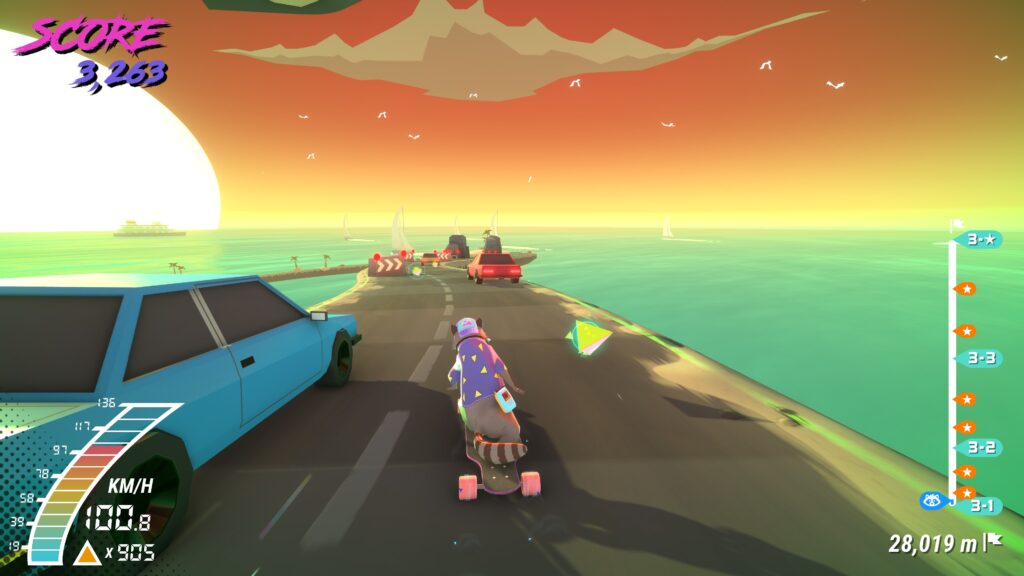
The controls are simple. Aside from the movement keys, you have a button to jump, drift, and another to revert. Most of them are primarily confined to gathering more points for a greater highscore or getting the currency known as Bits that litter the stage. At its heart, it mainly asks you to survive the road itself. It is filled with cars and lacks any kind of railing. If you lose control of your board, you are prone to fly right off the map into your death. That goes doubly so for upcoming curves to the road. You’ll be able to decelerate without drifting in the first few stages, yet it soon becomes a skill you’ll eventually have to learn. My main tip for drifting is to remember that you are not driving a car and not to expect instant control. Your little raccoon has to bellyflop and then get into position to sharply turn, so it’s best to press the drift button before you likely would in other racing games.
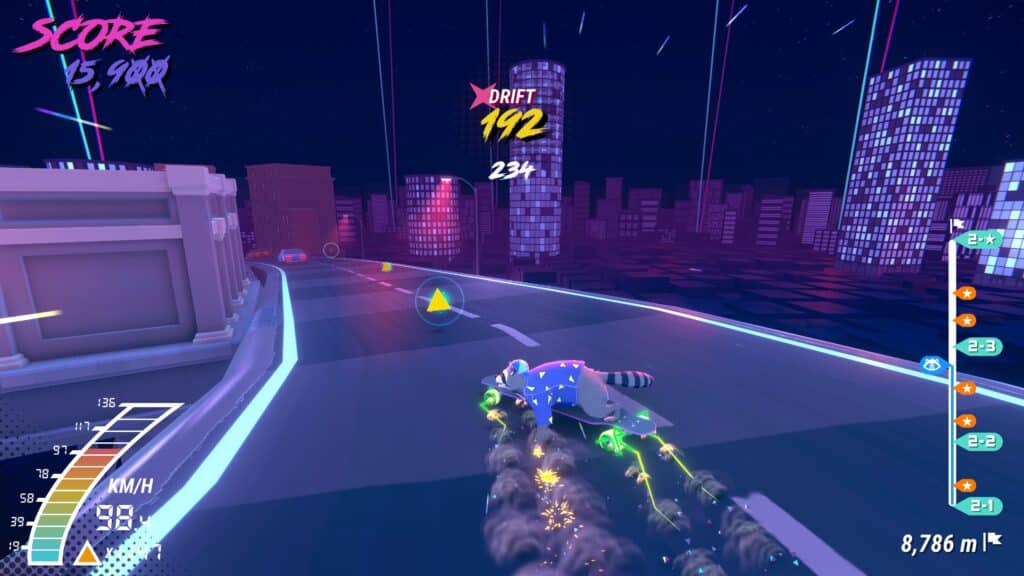
From the moment you boot up Tanuki Sunset, it will thrust you right into the thick of it in a tutorial. I appreciate it wanting to make a first strong impression, yet it still would have been nice to be able to access the options menu before all else. Complete the tutorial, and you’ll find yourself in a hub world where you can access said options menu, buy clothes for your raccoon, and customize your board. The purchase of anything requires Bits you collect in levels, and there is a decent amount of stuff to strive for. Everything is purely cosmetic. There are no stats or fine-tuning your board. A neat feature of this title is that any Bits you collect stay with you even if you die. No matter how poorly you are doing, at least you are making progress in getting some new drip for your raccoon.
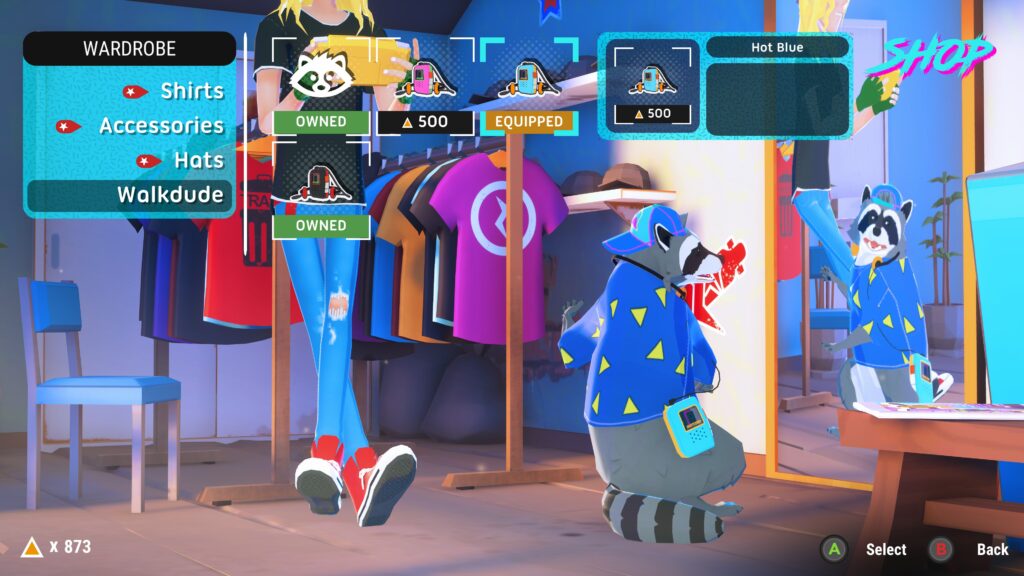
On the hub world, you’ll also see an arcade machine. It is used to access Trials for you to take on, and eventually, an Endless mode when you manage to beat the campaign. This leads me to an interesting point. Technically there are multiple levels, but they are part of the same seamless map. That allows you to either continue your run or save your position for whatever purpose, be it to back out to buy some clothes or quit the game. Odder still is Tanuki Sunset still features checkpoints between “levels” as well. The reason will soon become apparent. Your minimap on the lower right-hand does not properly convey just how enormous the entirety of the map is. It will take a couple or several minutes to go from the beginning of a level to just your first checkpoint. This fact is where a large part of the difficulty comes from. Any error or misjudgment on your part can easily set you back a fair bit. I’m unsure as to whether to call it a flaw. On the one hand, the tension of reaching a checkpoint is a highlight of the experience, but on the other, it heavily disincentivizes going out of your comfort zone.
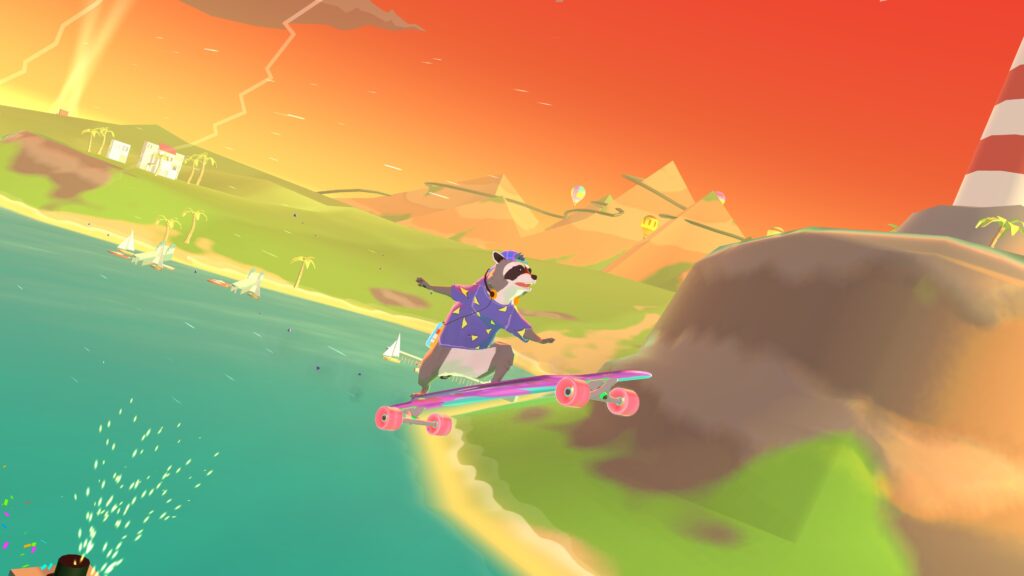
With Tanuki Sunset only featuring three maps that can be completed in around two hours, I’d say that the extensive lengths between checkpoints are an overall positive. Some of us are merely content to survive the experience, while others revel in mastering it. The time it takes us to navigate these treacherous roads forces us to improve. On top of that, seeing how high-level players get through a map is inspiring and a key component of arcade-styled titles. It certainly makes me want to keep playing and tackle some of the optional objectives I couldn’t the first time, such as winning a race against a flying seagull or trying to beat my old score. The lack of an online leaderboard is an unfortunate feature not in this title. You only have your past times and scores to match up against. In addition to the Trials and Endless mode, I feel it does justify its $15 price, which I’ve seen some discussion about this title’s value.

The soundtrack consisting of both Synthwave and Lofi songs is another highlight alongside the pleasing low-poly visuals. It feels a tad mismatched with the blink-and-you-die style of gameplay, yet it does get one into a zen-like state once you’ve got a handle on the challenge. Something worth mentioning is it seems an achievement is glitched on the Steam version of Tanuki Sunset that makes it impossible to 100%. With the last update being near its release on Dec 8, 2020, after unexpectedly poor sales, who knows if that will ever be fixed. If you’re an achievement hunter, that alone may be a deal-breaker. Luckily, that is the only technical issue that I know of. It ran smoothly, and I didn’t face any glitches throughout my experience. Most importantly for a game like this, the controls felt tight, and the hitboxes were spot on. You can easily weave and swerve through any narrow openings, giving one the sense of any death being on us.
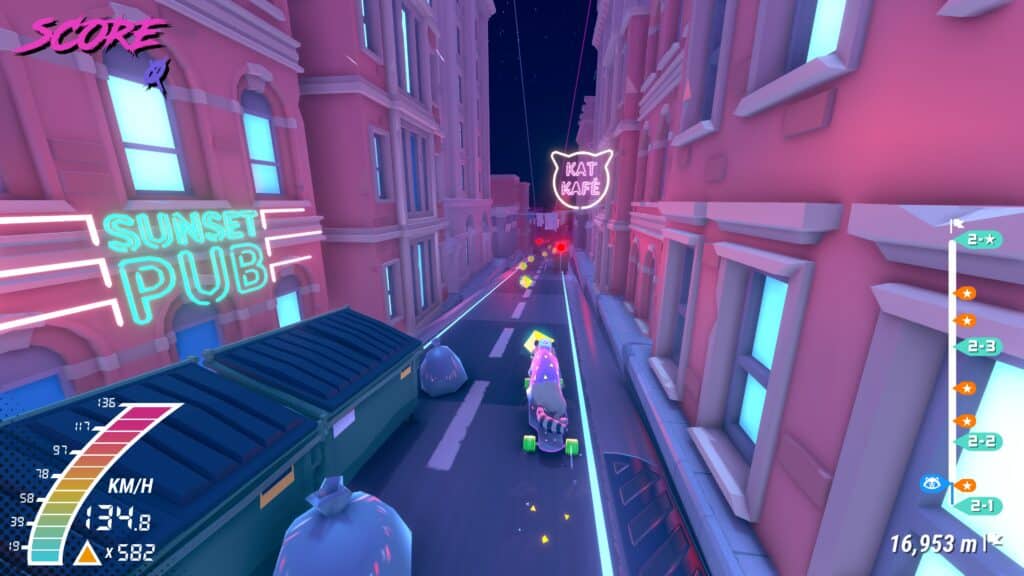
As cliché as it sounds, Tanuki Sunset is the epitome of easy to pick up and hard to master. It is quite the journey from nervously speeding head-first toward a moving car to purposely getting within licking distance for those sweet, sweet points. From hitting those corners like a gran to erasing the word ‘decelerate’ from your vocabulary. In some ways, your first playthrough feels like a test run, thanks to it introducing new gimmicks and mechanics throughout its entirety. To put a second cliché into a single paragraph, it feels more about the trip than the destination. If you’re looking to simply get through a game and be done with it, this may be a bit of a tough sale. There are only three maps and only cosmetic things to strive for. On the other hand, if you’d like a skill-based title to both challenge and continually improve your skills with, this is well worth it. Going from simply trying to stay alive to making full use of your moveset are two different experiences, with the latter being where Tanuki Sunset truly shines.
- Acrolyte Demo - April 11, 2025
- Lostaris Demo - April 4, 2025
- El Panadero -The Baker- Review - August 27, 2024